Dermatobranchus spp.
Order: NUDIBRANCHIA
Suborder: ARMININA
Family: Arminidae
A page for miscellaneous photos of species of Dermatobranchus which are probably unidentifiable. If you go to the Species List you will find a list of recognisable species, and related species of Armina.
Authorship detailsRudman, W.B., 2001 (June 6) Dermatobranchus spp. [In] Sea Slug Forum. Australian Museum, Sydney. Available from http://www.seaslugforum.net/find/dermspp
Related messages
Dermatobranchus from Pemba Island, Tanzania
October 27, 2009
From: Tamara Hartwich
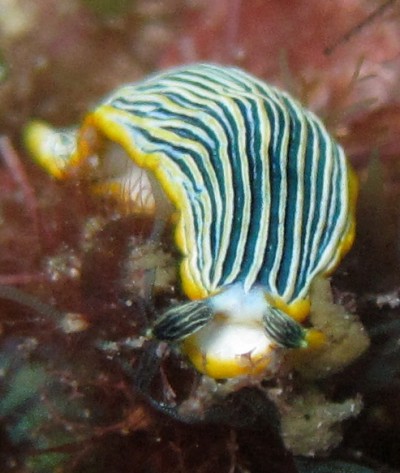
Concerning message #12509:
Hi
I am wondering whether you can help me with identifying this Armina?
20 m, Pemba Island, Tanzania, Indian, 27 September 2009. Length: 15 mm. Photographer: Tamara Hartwich.
Thanks
Tamara Hartwich
tamhartwich@yahoo.com.au
Hartwich, T.M., 2009 (Oct 27) Dermatobranchus from Pemba Island, Tanzania. [Message in] Sea Slug Forum. Australian Museum, Sydney. Available from http://www.seaslugforum.net/find/22697Dear Tam,
This is an arminid, but I suspect from its appearance that it is a species of Dermatobranchus. Most species of Armina are burrowers.We would need to look at its anatomy to be sure. Concerning its identity, this group is badly in need of revision, and I suspect finding a name at this stage is impossible. All I can do is call it Dermatobranchus sp. and put it with the miscellaneous Dermatobranchus
Best wishes,
Bill Rudman
Dermatobranchus from Indonesia
July 11, 2007
From: Ken Tucker
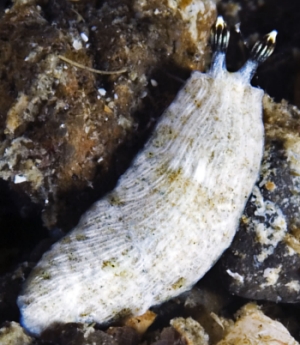
Again I cannot match to references...
Locality: Lembeh Strait - Nudi Falls, 10 metres, Indonesia, Sulawesi, 29 Nov 2006. Length: 2 cm. Photographer: Ken Tucker.
Ken Tucker
ken@kilili.com
Tucker, Ken, 2007 (Jul 11) Dermatobranchus from Indonesia. [Message in] Sea Slug Forum. Australian Museum, Sydney. Available from http://www.seaslugforum.net/find/19374Dear Ken,
This is a species of the arminid genus Dermatobranchus which all feed on octocorals of some sort. The species are in a taxonomic mess at present so apart from a few well known species I am not making any attempt to identify them to species. Specimens are often found in aquariums, presumably having hitched a ride of soft corals or so-called 'live rock'.
Best wishes,
Bill Rudman
Re: Aquarium mystery
March 4, 2005
From: June A. Gritmon
Hey Doc:
Thanks for your reply. They aren't 5 inches, they're 1/2 inch. Now I just pulled off about 5-6 of these guys tonight and one this morning (one was on the same leather and the other 5-6 were on my clove polyps). What will eat these guys? I heard some wrasse will eat them, but I don't know specifically what kind. Please help!! They really crawl into the clove polyps are are hard to get out even with tweezers. Help! :(
June
NYSharkLady@aol.com
Gritmon, J., 2005 (Mar 4) Re: Aquarium mystery. [Message in] Sea Slug Forum. Australian Museum, Sydney. Available from http://www.seaslugforum.net/find/13276Dear June,
Thanks for clarifying the length. I would have understood 0.5 inches - I guess I missed the '.'. I really can't offer a solution to your phenomenon. I am of course biased and have considerable sympathies for the slugs, which are only doing what they have evolved to do. I suspect not much will eat them. Most soft-corals have nasty chemicals in their tissues to deter animals from eating them. It is most likely that the slugs steal these chemicals and store them in their own bodies to protect them from predators. Unfortunately a fish that will eat the slugs is also likely to eat the soft-corals as well.
Sorry about that,
Bill Rudman
Aquarium mystery
February 28, 2005
From: June A. Gritmon

Hi all!
If you could please ID this and let me know if it eats corals I'd REALLY appreciate it! I found it on one of my leather corals tonight after the lights went out on my reef tank.
Locality: 90 Gal reef Tank. Length: ~.5 inch. 25 February 2005
Found on Leather Coral.
June A. Gritmon
NYSharkLady@aol.com
Gritmon, J., 2005 (Feb 28) Aquarium mystery. [Message in] Sea Slug Forum. Australian Museum, Sydney. Available from http://www.seaslugforum.net/find/13243Dear June,
I don't know this species, but I suspect it is a species of Dermatobranchus, since that group do feed of soft corals. I am surprised at your length of 5 inches, which equals about 12 cm. Most species of Dermatobranchus are between 1 cm and 3 cm. If it is a Dermatobranchus, it probably is eating your leather coral
Best wishes,
Bill Rudman
Dermatobranchus in aquarium
February 28, 2003
From: William Wing

I can't seem to find anything like this in my books and so far on the forum
William Wing
wcwing@chartermi.net
Dear William,
I am about to a prepare a page of common aquarium hitch-hikers to make identifying these things a bit easier for aquarium keepers. This will certainly be there. It is a species of arminid nudibranch called Dermatobranchus. These animals feed on soft corals and almost certainly arrive in aquariums on soft coral colonies. There are quite a few small fairly nonedescript looking species which are impossible to identify at this stage.
Best wishes,
Bill Rudman
Dermatobranchus in aquaria
February 6, 2003
From: Ron Shimek

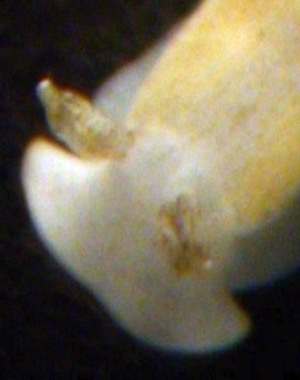
Hi,
I found about half a dozen of these animals in an aquarium. So... I have no idea of original locality. It could literally be anywhere in the tropics. They are living at 27 deg C.
The animals are about a centimeter long, and a millimeter wide. They look like white Armina, but with no ridges on the back. The rhinophores are brown speckled on a white background and have 3-4 raised ridges in a more-or-less helical pattern.
Ron Shimek
rshimek@imt.net
Shimek, R., 2003 (Feb 6) Dermatobranchus in aquaria. [Message in] Sea Slug Forum. Australian Museum, Sydney. Available from http://www.seaslugforum.net/find/9127Dear Ron,
Your animal is a species of Dermatobranchus, which is closely related to the genus Armina. Most species feed on soft corals, and they seem to be a fairly common hitchhiker, travelling, probably as inconspicuous juveniles, on the soft-corals which are collected in the tropics for the aquarium trade. I guess if you have them then you have the right soft-coral for them to feed on. Whether you remove them from your aquarium depends on whether you prize them more than their food.
Best wishes,
Bill Rudman
Dermatobranchus? from Thailand
October 25, 2002
From: Erwin Koehler
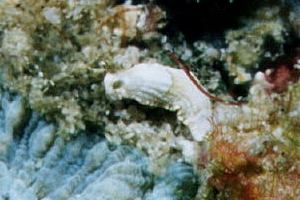
Dear Bill,
Here is the another one from Thailand, Racha Noi Island, divesite "Maritta's Rock",
depth 16m, size 8 mm, date Dec. 14, 2000. Can you help with an ID?
Erwin
Erwin@medslugs.de
Koehler, E., 2002 (Oct 25) Dermatobranchus? from Thailand. [Message in] Sea Slug Forum. Australian Museum, Sydney. Available from http://www.seaslugforum.net/find/4077Dear Erwin,
This is a species of Dermatobranchus, but I am afraid we don't know enough about them at present to say much more.
Best wishes,
Bill Rudman
I think its eating my Clavularia
June 10, 2001
From: Dallas Stroud
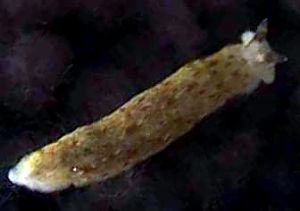
Hello,
I found about 150 of these nudibranchs in my reef aquarium, most of them were on or around a piece of clavularia that was dying. They are only about a 1/8 inch long max and they vary in shades of tan-brown and have very short frills (gills?) on there sides. At night they are all over the place but mostly around the clove polyps. I have pulled most out and I also pulled the clove polyp out and threw it away because it was dead. Could you tell me what species it is and if it only eats clavularia? I have attached a picture in jpg format I can take more if you need them but I don't think I can get any closer.
Thank you in advance.
Dallas
fish_guy_101@yahoo.com
Shroud, D., 2001 (Jun 10) I think its eating my Clavularia. [Message in] Sea Slug Forum. Australian Museum, Sydney. Available from http://www.seaslugforum.net/find/4428Dear Dallas,
Your slug is an arminid nudibranch of the genus Dermatobranchus. We don't know much about their natural history but the few we do know something about are soft coral feeders so its almost certain they are eating your Clavularia. They were probably on the soft coral when you got it as very small larvae.
As I don't know where you are or where the Clavularia came from I can't even guess at an identification. Have a look at Dermatobranchus sp. 1 for inofmration on their feeding.
Best wishes,
Bill Rudman
